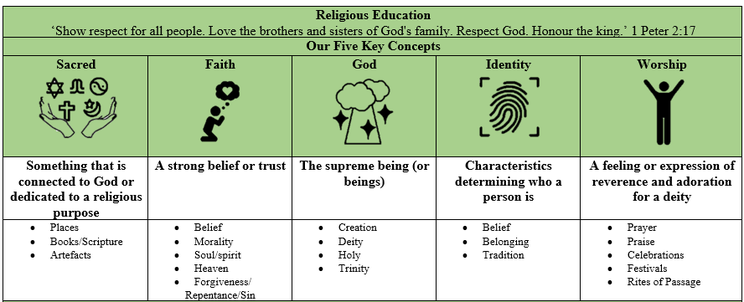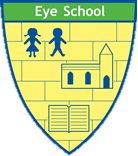RE
The RE curriculum is constructed to provide accurate knowledge and understanding about Christianity and a range of religions and worldviews. It has a high status and meets the requirements expected of a Church school. RE challenges pupils to learn and critically think by taking their learning beyond expectation. Consequently, pupils respond thoughtfully to what they have learned. Five key concepts are interwoven within the RE curriculum. These enable pupils to develop sophisticated ideas about beliefs.
SIAMS Report, 202
Our Definition of RE
Religious Education allows us to hold balanced and informed conversations about religion and belief.
Aims of RE at Eye CE Primary School
Our learning in RE should help us to:
Our Religious Education (RE) curriculum aims to provide a well-rounded and enriching education that promotes understanding, respect, and tolerance for a wide range of beliefs and practices. Our goal is to equip pupils with the knowledge and skills to engage critically and reflectively with religious and non-religious worldviews, promoting spiritual, moral, social, and cultural development. We aim to foster an environment where pupils explore their own beliefs and values while developing an appreciation for the beliefs of others, contributing to a more cohesive and harmonious society.
Our aims for RE align with those of the 2023 Peterborough Locally Agreed Syllabus:
- to develop religious literacy;
- to acquire and develop knowledge and understanding of Christianity and the other principal religions and world views represented locally, nationally, and globally;
- to develop an understanding of the influence of the beliefs, values and traditions on individuals, communities, societies, and cultures;
- to develop attitudes of respect towards other people who hold views and beliefs different from their own;
- to develop the ability to make reasoned and informed judgements about religious issues, with reference to the principal religions and world views represented locally, nationally, and globally
To do this, RE should develop pupils' skills:
- to read fluently
- to enable them to ask questions
- to discover information, to approach new material with empathy
- to reflect on their learning. Pupils should not only acquire knowledge but also be able to use their knowledge to understand their world, build community, and develop their personal position.
Throughout the RE curriculum, pupils should be encouraged to explore religions, engage with their knowledge, and reflect on their learning and their lives.
Opportunities to develop spirituality
The subject of Religious Education (RE) plays a vital role in fostering spiritual development in children. It offers opportunities for pupils to explore profound questions about meaning, purpose, and values, helping them to understand and reflect on their own beliefs and those of others. Through studying different religions and worldviews, our pupils are encouraged to think about the deeper aspects of life, such as identity, morality, and existence, which nurtures their spiritual growth.
RE promotes self-awareness by allowing students to contemplate their own beliefs and feelings, contributing to a sense of personal identity and inner peace. It also encourages empathy and respect for others, fostering a sense of connection and understanding of the diverse world they live in. Additionally, RE provides space for children to experience awe and wonder, whether through learning about religious practices, rituals, or the natural world, which can be powerful experiences for spiritual development.
By engaging with stories, teachings, and traditions from different faiths, children learn to appreciate diversity and develop respect for all people, which is integral to living a full and meaningful life as envisioned in John 10:10. The curriculum also encourages personal reflection and spiritual growth, helping students connect their learning to their own lives and the world around them.
In this way, RE supports the holistic development of children, helping them to grow not just academically, but also spiritually, emotionally, and morally. This comprehensive development enables them to live life abundantly, in line with the Christian vision of John 10:10, which is about experiencing the fullness of life through love, faith, and understanding.
Curriculum Organisation
The school’s work in RE is based on a combination of Peterborough’s Agreed Syllabus 2018 as required by law.
We also use the Peterborough Diocese Syllabus to augment our curriculum and learning within RE.
The Agreed Syllabus for Peterborough can be found at:
https://www.peterborough.gov.uk/residents/schools-and-education/religious-education
Each Key Stage builds upon the one before, so by the time pupils reach the end of KS2, they should have had the opportunity to receive a broad, inclusive religious education. Teachers consider the religious experience of the pupils in the whole school when planning which religions to look at and in which order.
Christianity is studied in all Key Stages. The choice of which other religions to study in KS1 was based on the experience of the pupils in the class and local demographic. By the end of KS2, all major religions (Christianity, Islam, Judaism, Hinduism, Buddhism and Sikhism) and a secular world view (humanism) will have been considered.

We also use Understanding Christianity to support our teaching which focusses on the 8 concepts, which help the children understand the Big Story of the Bible.

In our classrooms we display the Big Frieze, which helps the children understand where their learning fits within the Big Story of the Bible.

Right of withdrawal
Parents have the right to withdraw their children from all or any part of RE. Requests for this should be made in writing to the head teacher.
Our RE curriculum information and LTP can be accessed here:
Our RE Policy can be accessed here:
